
by Meredith (USA) | Apr 25, 2014 | 2014, Awareness, Communication, Education, Family, Gun Violence, Kids, Life Lesson, Motherhood, Parenting, Safety, School, Tragedy, USA, World Motherhood, Younger Children

Growing up in Illinois, when I was in elementary school, it was commonplace for our school to have several emergency drills in case there was a tornado. We knew to hide under our desks and cover our heads with our hands and wait until the drill was over. The thought behind the drill was that we would be ready if a disaster ever struck. We followed up with fire drills as well. We prepared for what we knew could happen but hoped would never happen to us… (more…)
Meredith finds it difficult to tell anyone where she is from exactly! She grew up in several states, but mainly Illinois. She has a Bachelor of Science degree in Elementary Education from the University of Illinois at Champaign/Urbana which is also where she met her husband. She taught kindergarten for seven years before she adopted her son from Guatemala and then gave birth to her daughter two years leter. She moved to Lagos, Nigeria with her husband and two children in July 2009 for her husband's work. She and her family moved back to the U.S.this summer(August 2012) and are adjusting to life back in the U.S. You can read more about her life in Lagos and her adjustment to being back on her blog: We Found Happiness.
More Posts

by Purnima Ramakrishnan | Apr 22, 2014 | 2014, Awareness, Brazil, Environment, Human Rights, Humanitarian, Purnima, Social Good, Water, World Moms Blog
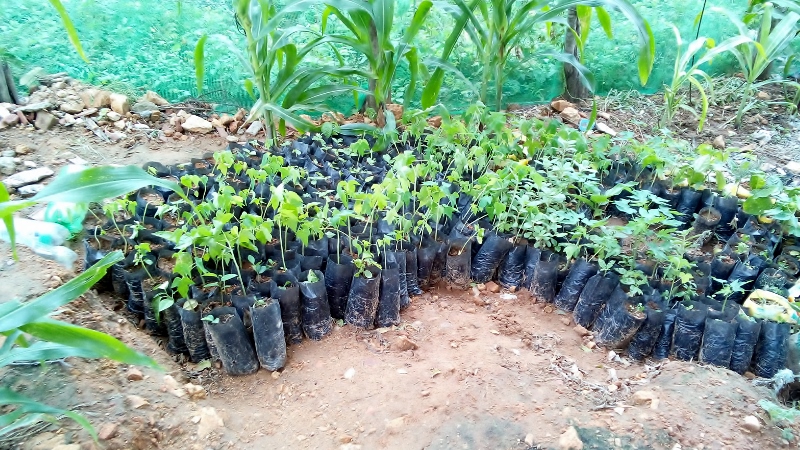
Photo of Celia’s saplings by Purnima Ramakrishnan
“Universal access to water is a right to all and now it is just on our doorsteps” said farmer Celia. I was traveling as a International Reporting Project Fellow, and we had just arrived in the semi-arid city of Cumaru, in the North-Eastern state of Pernambuco.
We had lunch at Joelma’s place who is a farmer in Cumaru. She made delicious rice, palma salad with lots of vegetables in it (a variety of sustainable cacti, native to the lands and which is used to feed both livestock and people). And then we went to her sister-in-law, Celia’s farm. Celia is also a farmer.
When Celia was six years old, she used to go downhill and carry water back up to her home in pots and buckets, and she recalls them being very heavy. When she cajoled her father, he sometimes let her use a donkey to bring it back home. This, the six-year-olds woke up at 3 AM every day to do. I have an 8-year-old at home, and I cannot imagine giving him such a life.
Today though, she is grateful that she can give her own two-year-old, a better life, thanks to the Cisterns project.
The average rainfall in these semi-arid lands varies from 200 to 800 mm, which is very irregular for habitation. Moreover, the amount of evaporation in these lands is three times higher than the rainfall. Hence it becomes even more important to capture the rainwater for families during the dry season. This is the concept of the Cisterns project.
The ASA (Articulation Brazilian Semi-Arid) is a network of social organisations operating in the Northeast of Brazil which aims to “empower civil society to build participatory processes for sustainable development and cope with the semi-arid land based on cultural values, and social justice.”
ASA was born from accumulated experience of organisations and social movements that have worked for years in the perspective of living with the Semi-arid climate. In 1999, the ASA presented a joint project for the Semi-arid to the society and the government, and thus the Articulation became a network.
In 2003, ASA launched P1MC (Program One Million Rural Cisterns), which aims to build 1 million water reservoirs to meet the needs of 5 million families. Currently there are 500 thousand reservoirs and the program has graduated into a public policy adopted by the Federal Budget.
These water reservoirs or cisterns are of two types. Every family has cisterns with a capacity of 16,000 litres of water for domestic use and another of 52,000 litres of water for farming and livestock use. The technology employed here is called social-technology and basically collects water from the rooftops and harvests the rainwater. The families are given a course in water management and are also requested to take a course in farming in semi-arid.
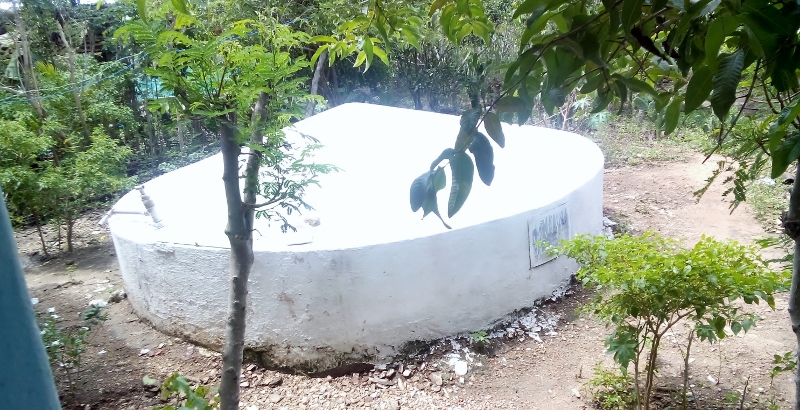
Photo of a 16000 litre cistern by Purnima Ramakrishnan
Celia says, she is now employed and this has brought about female empowerment along with water, and agriculture, all because of the cistern on her doorstep.
She cultivates small saplings and sells it to the other farmers. She grows corn, papaya, oranges, tangerine, beans, cashew, Umbu, tamarind, and many other things. She also sells the produce (though now too much) in the market and to other farmers. Her husband works in construction department in the town, whereas she lives in the village doing her farming with her two-year-old. She hopes to give a better life to her son.
She has been taught in her course to cultivate three types of plants, she says. The first is the native plants which thrives well on the soil of the area with not much dependency, and is more suited to the semi-arid climate like the Umbu. Then the plants which are not suited to the area, like corn, for which abundant water is available from the cisterns. And the third type is the plants for the livestock like Palma. This ensures that the plants give back to nature what they take from it. The soil gets enriched and also nurtures the plants. It is a two-way process.
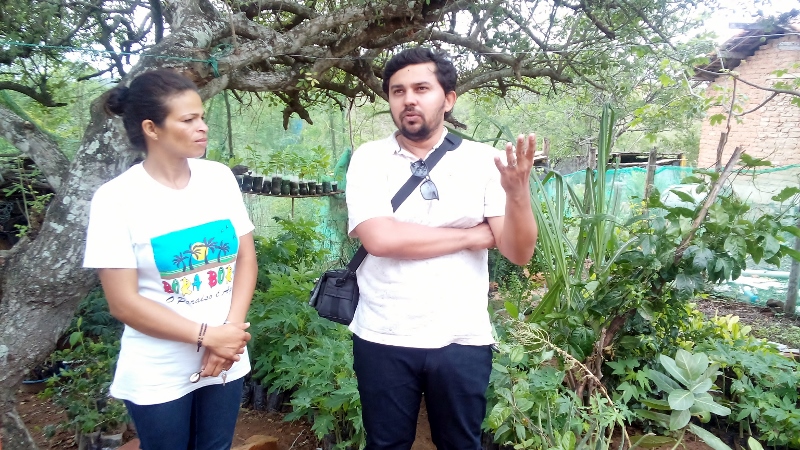
Carlos-explaining-about-the-cisterns-and-farmer-Celia-looking-on Photo by Purnima Ramakrishnan
This seed of change stimulated by social organisations that operate in the region have prompted the development of coexistence of half-barren lands with practical goals absorbed by the government to promote sustainable living.
We asked Carlos, the program coordinator of ASA in the region, “Is this a solution for food security?” He said it is much more than that. It is a solution for independence, female empowerment because of employment in one’s own farm, it is a way to make the semi-arid a much greener place to live, it is a solution to democratize water, and make it a universal right, not a consumer product.
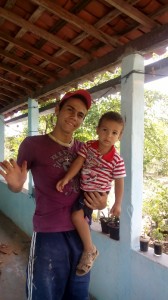
Celia’s son and nephew, Photo by Purnima Ramakrishnan
I remember that water was more expensive than beer in my hotel. And I now knew why! One should not pay to have to drink water, he said.
This concept can be embraced in many developing semi-arid regions.
On this Earth Day, let us pledge to make our cities greener and conserve water. Let us spread such buds of change through social media, and other channels.
How do you plan to honor this Earth Day?
This is a post written by Purnima Ramakrishnan on her #BrazilMDGs trip to Brazil as a fellow of Journalism with the International Reporting Project.

by Alison Fraser | Apr 15, 2014 | 2014, Africa, Canada, Education, Girls, Human Rights, International, Kids, Life Balance, Life Lesson, Motherhood, Philanthropy, Poverty, Social Equality, Social Good, Womanhood, Working Mother
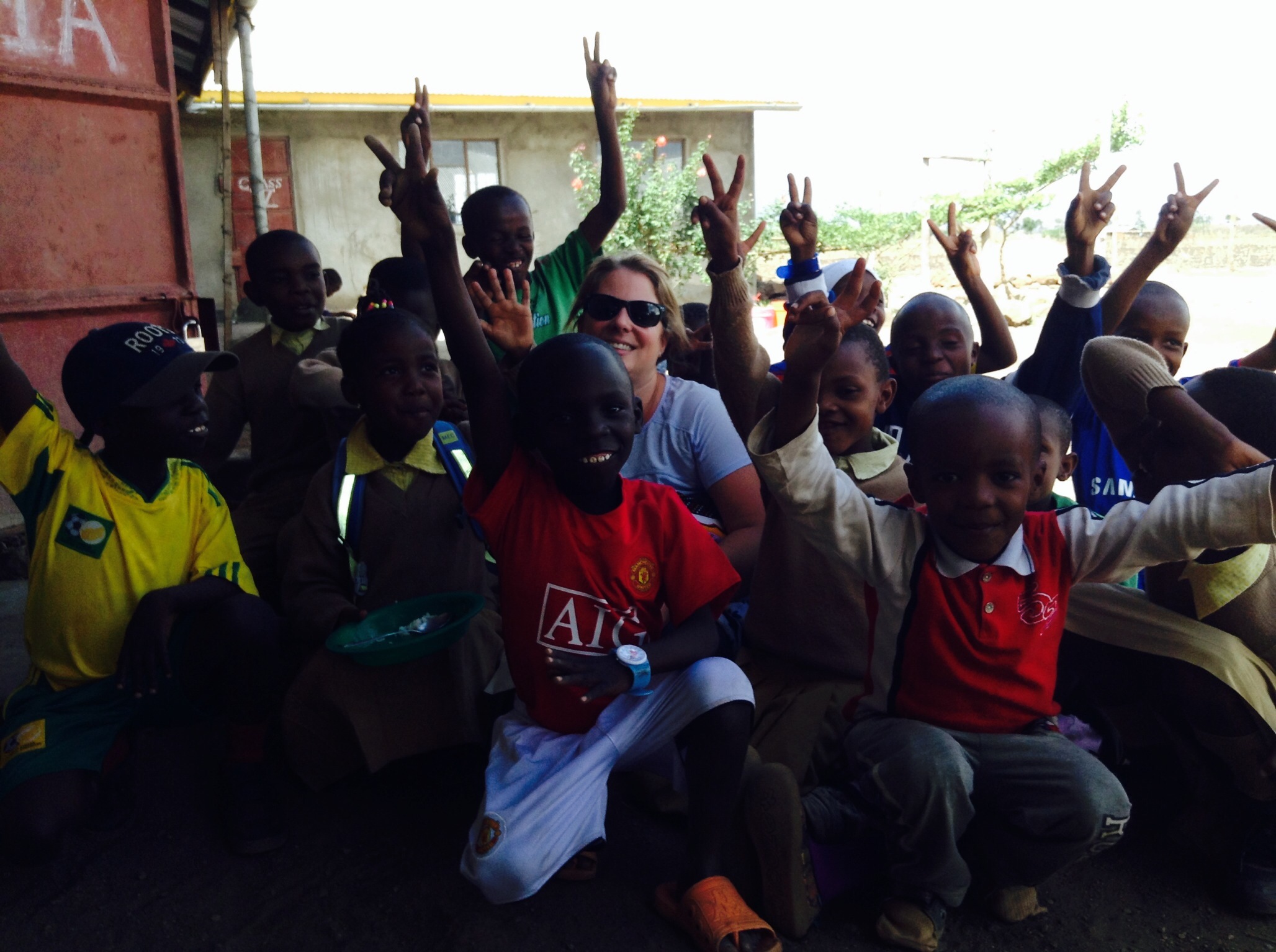
Last November, I visited Tanzania to meet all of the students of the Mom2Mom Africa program, a not for profit organization that I started a short while ago. I remember visiting and spending time with all of the students in the program, and they would refer to me as “Mama”. This is common, and initially I didn’t give it much thought. But, I vividly remember the school director telling me that all of these students are just like my “children”. He said, go back to Canada knowing that you have more than 40 children here in Tanzania! It was so touching, and brought tears to my eyes…yet at the same time, the responsibility of it all was so terrifying. Could I meet their expectations? Could I really be a “good” mama to all of these little ones?
You see, I have three little girls of my own back at home. My time is stretched thin providing for them. Could I really be a good mommy and mama? I struggle daily with how to balance both.
People often talk about mommy guilt. It is a concept I understand all too well, being a working mom. I have made many concessions in my career in order to balance work and family.
I work a reduced work week so that I can spend as much time with my girls as possible. So far, it works for us.
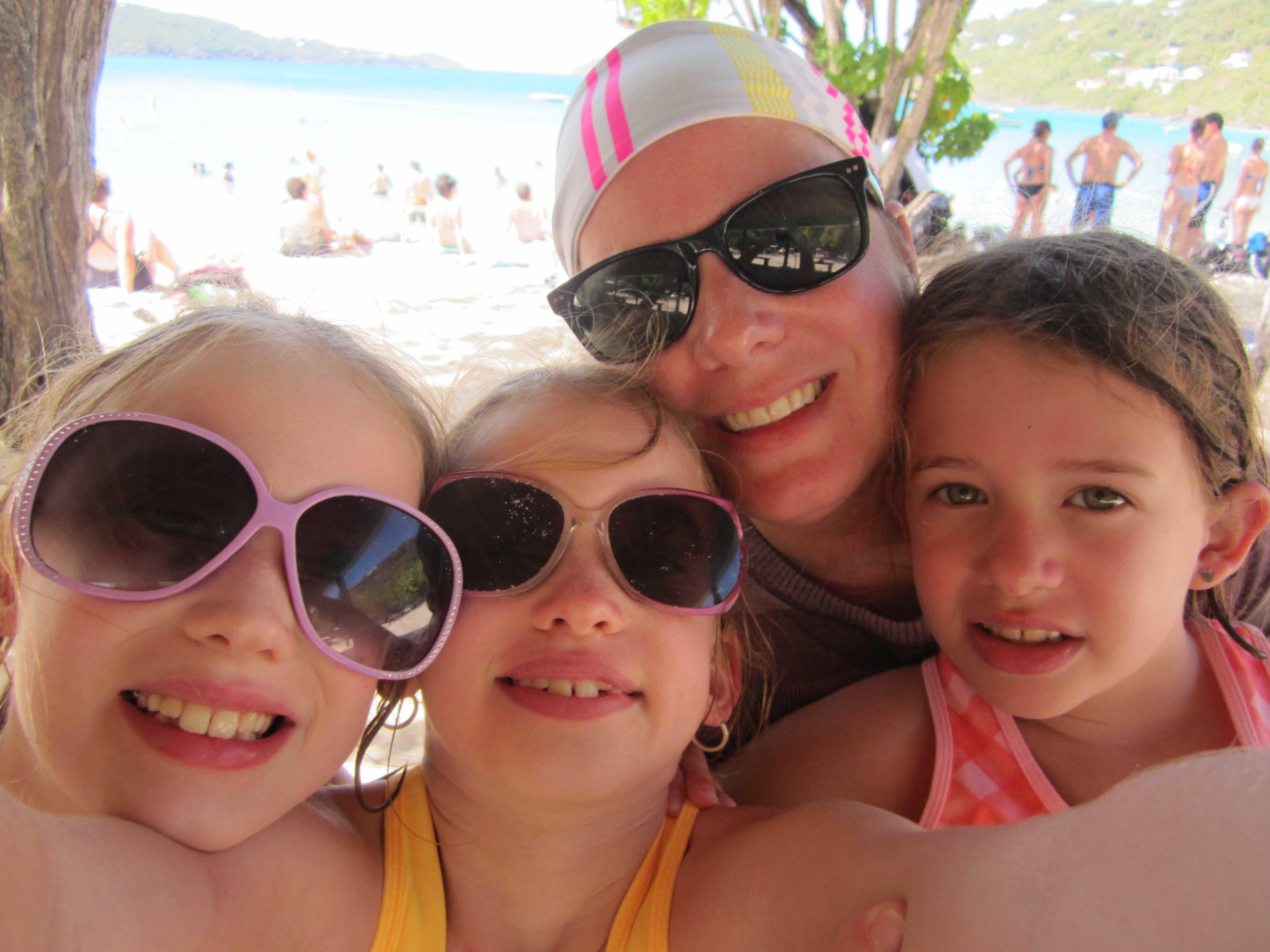
But now, I struggle to balance the pressures that come with my not for profit organization work, especially being a mama to these Tanzanian children who stole my heart last November. I am constantly worrying about them, working to secure funding to send them to school, and keeping tabs on their families, many of whom struggle with illness. I spend countless hours on this; late nights and weekends. And, I love every minute of it. But, it does take time away from my little girls…and that causes guilt…mommy guilt. Should I be spending less time working on Mom2Mom Africa and more time with my children…and then other times, I worry about the exact opposite. It seems like I am forever in guilt mode. When I am in Canada, I worry about the children in Tanzania. Yet, booking my next trip to Tanzania in July caused major guilt. I can’t win.
So, I talked to my daughters about this recently. I tried to explain how being a mama and mommy can be really difficult. Thankfully, all three of my girls were supportive beyond their years. My girls are my world. And my work in Tanzania, and the children there, are always in my heart, and mind. I just have to do the best I can at balancing both worlds and hope that I succeed.
I think mommy guilt is a common thread that all of us moms feel at one time or another. We are likely too hard on ourselves and most often are doing a better job than we actually give ourselves credit for. And in the end, I think I can be both a mommy and mama. I just have to be conscious of keeping a healthy balance between both! And I now know my girls will help me keep it all in check! Knowing I have their support eases the mommy guilt, and lets me instead channel that energy into being a good mommy and mama! Or at least the best one that I can be!
Mom2Mom Africa has just launched an indiegogo campaign to build a new school and implement a food program at one of the schools they send students to in the Mom2Mom Africa program. Click HERE if you would like to be a part of this exciting campaign.
Can you relate to the “Mommy Guilt” dilemma?
This is an original post written for World Moms Blog By Mom2Mom Founder Alison Fraser.
Alison Fraser is the mother of three young girls ranging in age from 5 to 9 years old. She lives with her family in Cambridge, Ontario, Canada. Alison works as an Environmental Toxicologist with a human environment consulting company and is an active member of the Society of Environmental Toxicology and Chemistry (SETAC). She is also the founder and director of the Canadian Not for Profit Organization, Mom2Mom Africa, which serves to fund the school fees of children and young women in rural Tanzania. Recently recognized and awarded a "Women of Waterloo Region" award, Alison is very involved in charitable events within her community including Christmas Toy and School Backpack Drives for the local foodbank.
More Posts - Website
Follow Me:



by Purnima Ramakrishnan | Apr 11, 2014 | 2014, Brazil, Human Rights, Humanitarian, Humanity, Purnima, Social Equality, Social Good, The Alchemist, World Moms Blog, World Voice
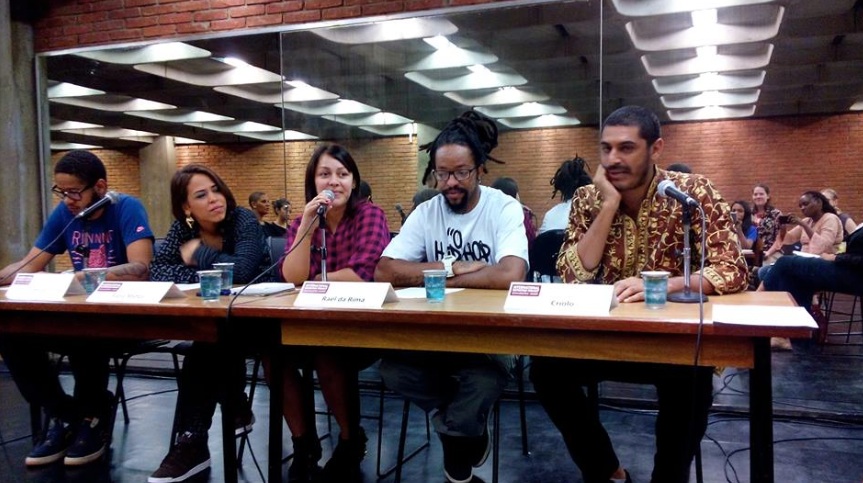
Centro Cultural Sao Paulo
Our visit to Sao Paulo with The International Reporting Project was coming to a close. After a very hectic day of Community heath visits and chatting with doctors, nurses, and community health workers, we just had to do something very cool. And what nicer thing than to rap our way into it?
We met the awesome International acclaimed Brazilian rap group at Centro Cultural Sao Paulo, and it was a great honor to be in their presence.
In the 1990s a musical style known as rap consciencia (socially conscious rap) originated in Brazil. These days it is making huge waves and improving the lives of people by making them socially conscious of their choices, their lifestyles, rights, issues, and gently coaxes them to dream of things which generally are taboo to dream about, for the Afro-Brazilian ethnicity.
Criolo was 11 years old when he started writing lyrics and now he has chart busters in London, New York and Paris. At the tender age of 11 he wrote about social issues. Social inequality is a major problem in Brazil. There is still prejudice across Brazil.
Criolo said, “there are so many ways to live. To wake up, to eat, to get to work and then get some money and then to eat again, is one way. If that is to live, it means people sell themselves for some food and money. That is just a process. Stop it. Live life. Let us talk about ourselves, our passions and aspirations and our joys.”
Rael da Rima was 11 when his music band used to talk about social injustice, racism, and equality to all. He talked a little bit about his personal life, and how rap music changed his life, and the lives of people living around him.
He said, “I give you an analogy for the social inequalities in Sao Paulo. Some people use this mineral water (indicating the drinking water on the table) to wash their BMW cars, and yet some do not have access to clean drinking water. Sao Paulo is a city of extreme contrasts. I sing so that people consciously become aware of their own lives and strive to improve it.”
Rael singing of his passion for rap music:
Emicida says, “When I was young, to get into college was not something youngsters would think about. Just to let the day go by was an accomplishment. Nowadays when I walk through the favela(slum) I grew up in, I am so happy to see the youngsters talking about their dreams of being in college and to get a ‘real’ job. When slavery was abolished, it was both a curse and boon. A curse because people were pushed into poverty and violence with no support system, a lot of confusion, and no real understanding of what was happening in society or the political and economic scenario of the country. My rap is to inspire people to talk about their dreams, how to get out of social inequalities and to be truly free. In everyone there is a human being and I wish for each one to know it. Through rap music, the magic of communication is established, and people are inspired to know themselves as such.”
Emicida singing for World Moms Blog
Flora Matos was 18 when she decided to move to Sao Paulo from Brasilia. She sings so people are free of sexual prejudice. She says her music always speaks of love – love for all kinds of people – love for humanity as a whole and breaking anything which could make people hate each other.
Flora Matos singing of love – love for people, passions, and love for all of humanity
These musicians and others like them are not people who sign on big labels or crave all of the fame and popularity. They just want justice, recognition of the minorities as human beings, and some peace for their community. And they do it through rap music.
They sing about poverty, prejudice, abuses of various types, about the blacks and whites in Brazil, and the classes. Flora said, all her numbers are characterized by experiences, either her own, a friends or someone she knows about. So this idea of communication which Emicida says – that is the magical bond – is established. This communication through music is not just passing of information or ideas or activism – it is an expression to bond humanity, a gentle prod to awake, and be aware. So through the actual performance the listeners carry back this vital element of being part of the movement.
So even though they do not directly change anything, or may not be able to give statistics and figures, they change attitudes, and invest in developing agents of change – which is a very vital thing to forge a developing society, progressing towards success.
I am not a big fan of music, not even Indian music, but that day I promised Criolo I would look him up on Youtube. He was mildly surprised to know that I came for a meeting with rap artists when I was not into music at all. I explained that it was because I learnt they worked for social causes through music, and I was interested in that. He wished me luck and said he would look up World Moms Blog too and we parted.
Just for fun, I also recorded some street musicians the other day in Sao Paulo’s Avenida Paulista, one of the poshest locality in Sao Paulo. I cant help sharing the below one.
This is an original post to World Moms Blog by Purnima Ramakrishnan, our Indian mother writing from Chennai, India. Her contributions to the World Moms Blog can be found here. She also rambles at The Alchemist’s Blog.
Photo credit to the author.
Purnima Ramakrishnan is a fellow of Journalism with the International Reporting Project (IRP), reporting from Sao Paulo, Brazil. Follow on Twitter at #BrazilMDGs
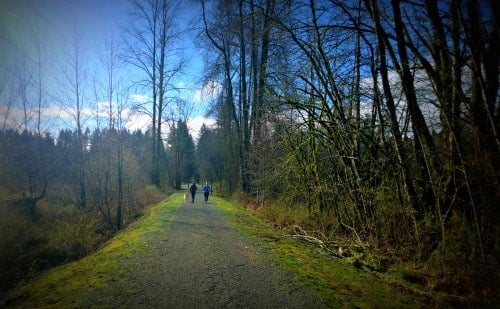
by Tara Bergman (USA) | Apr 11, 2014 | 2014, Being Thankful, Communication, Health, Humanity, Inspirational, Life Lesson, Maternal Health, Tara B., USA, World Motherhood
 I was mentally sabotaging my morning run before the day even started. I laid in bed the night before thinking about how I was getting to sleep too late after eating too much junk when I knew I was coming down with a cold. I had not set myself up for success and felt guilty. I tried to tell myself if I was that beat tomorrow, I would skip it. I woke up in the middle of the night twice for other reasons but couldn’t help but think of how I tired I would feel come morning.
I was mentally sabotaging my morning run before the day even started. I laid in bed the night before thinking about how I was getting to sleep too late after eating too much junk when I knew I was coming down with a cold. I had not set myself up for success and felt guilty. I tried to tell myself if I was that beat tomorrow, I would skip it. I woke up in the middle of the night twice for other reasons but couldn’t help but think of how I tired I would feel come morning.
As I prepped the kids for school and got through breakfast with way too much coffee, I told myself how I was not well-hydrated and would be dragging. Should I even go? I kept moving but my inner voice whispered that I could just walk today if I felt overwhelmed. That voice said, “Listen to your body. If you don’t feel up to it, don’t do it.” Then a competing inner voice mocked, “But it’s your own fault for not feeling up to it, so go suffer through it.” I carried on.
When I got to the trail, I saw flashing lights up ahead. I almost stopped, thinking I should not run that way. However, I pushed on telling myself to see what the lights were about before bailing. They were just for a parked maintenance vehicle being unloaded, so I jogged on.
I was sluggish the whole time. I felt slow, heavy and bummed about not taking better care of myself. Still, I kept going. I told myself I would cut it short if it felt like too much, but then I knew the negative self-talk would grow. My knee was a little achy, and my spirits were low. Nonetheless, I kept putting one foot in front of the other and tried to lose myself in some music.
Then I spotted a young woman I often see on the trail. She is gorgeous with long hair, bright eyes, and slim body. She usually takes long walks, and we exchange waves and smiles as I go past. Today as we crossed paths, she was jogging. She stopped and told me in a panting voice that I had inspired her to stop walking and start running the trail. I congratulated her on her efforts, and we both went on our ways. All of a sudden, I was lighter. I ran without issue. I didn’t think of my knee, my weight or my tiredness. I just ran and finished up the run on a high note.
Her simple compliment made such a difference on my perspective. This beautiful woman told me I had kicked her butt into gear. I had fallen into the trap of cutting myself down mentally while assuming this other gal had it all together. How could she not?
But we all have stuff. We all have the stories we tell ourselves.
I’m an upbeat person who usually focuses on the good, but like everybody, I have days (like today) when I focus on the bad. The fact that this gal stepped out of her comfort zone both to run and to tell me, a stranger, that I had inspired her to do so snapped my head back on straight. Her gesture reminded me of a few things that I know to be true:
1) Just getting out and taking each step counts, even if it’s not your best performance. Looking back, I placed so many obstacles in my own path for this run, but I pushed past each one. Not my best run, but I still did it. That is worth something.
2) There is always going to be someone achieving in an area that you are not. Someone will always be smarter, thinner, happier, healthier, wealthier, etc. It’s okay to admire or be inspired by that someone, but do not judge yourself harshly by that someone. Measure yourself against yourself.
3) Everybody has challenges and doubts going on. Everybody. We’re human. We’re not perfect.
4) It never hurts to tell someone, even a passerby, something nice. You may just change their whole day. You may just change their whole life. Kind words are that powerful.
My trail acquaintance probably has no idea how much her words impacted my day. When I see her next time, I’ll tell her. Plus, I feel prompted to tell someone else how they inspired me. I have been meaning for some time to tell a certain person how they unknowingly helped me to make a life change for the better. I haven’t done so yet, despite ample opportunity, because I don’t want to seem too familiar to an acquaintance. However, today has taught me that hearing you changed someone for the better is never too familiar.
Have you received an unexpected compliment that changed your day? Is there someone who has unknowingly inspired you to try something new, and have you told them?
This is an original post to World Moms Blog by Tara B. of Washington (State), USA.
Photo credit to the author.
Tara is a native Pennsylvanian who moved to the Seattle area in 1998 (sight unseen) with her husband to start their grand life adventure together. Despite the difficult fact that their family is a plane ride away, the couple fell in love with the Pacific Northwest and have put down roots. They have 2 super charged little boys and recently moved out of the Seattle suburbs further east into the country, trading in a Starbucks on every corner for coyotes in the backyard. Tara loves the outdoors (hiking, biking, camping). And, when her family isn't out in nature, they are hunkered down at home with friends, sharing a meal, playing games, and generally having fun. She loves being a stay-at-home mom and sharing her experiences on World Moms Network!
More Posts

by Purnima Ramakrishnan | Apr 8, 2014 | 2014, Brazil, Health, Humanitarian, Purnima, The Alchemist, World Moms Blog
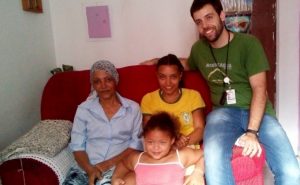
Raimunda with her family and Dr. Rodrigo D’Aurea from the Community Health Center
Raimunda is a 46-year-old mother to two beautiful daughters aged 19 years old and 7 years old. She sadly has lungs cancer, stage-4, has undergone chemotherapy, and now is in palliative care. Her family physician, Dr. Rodrigo D’Aurea took us to her house yesterday in a locality called Boa Vista in the suburbs of Sao Paulo which has a population of 20,000 people. She was diagnosed almost a year and half ago and she was already in stage-4. She has a very aggressive form of lung cancer. She used to smoke a long time ago, but has kicked the habit for more than a decade. Her husband used to contribute to the family’s upkeep until her elder daughter was 18 years old, but in the past year, he has stopped doing it. She has some pension from her retirement and she crochets for a living. You can see the beautiful white crochets folded on her couch.
Her doctor says, there are four things he has to take care of – firstly the physiological aspect of her body having cancer, secondly her psychological acceptance, how she deals with it, and accepts it emotionally, thirdly her dependents (here her daughters who will need to be adopted after her time), and fourthly he has also spoken to her priest and arranged for things. It made us a bit sad listening to it, this way. But hold on, there is more to this article. Melody, Julianna (our translator), and I accompanied Dr. Rodrigo D’Aurea and the health care worker on a work visit.
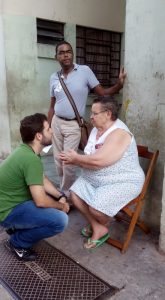
Dr. Rodrigo D’Aurea being greeted by yet one of his elderly patients on the street. The community health worker looking on.
I am here all the way from India as an International Reporting Project Fellow, reporting about the Public Health Center’s community visits. Here, a team consisting of a doctor, a nurse, two nursing assistants, a community health worker visits their patients in their assigned locality (Boa Vista here) and speak to the people and treat them. As we walked along the streets, I could see every resident saying “Ola” (Hi/Hello) and “Tudu Bem” (How are you) to Dr. Rodgrigo. It looked like he was a friend, a son, a brother to everyone whom we passed along in the streets.
The USB (Unidade Basica de Saude) which basically means Unit of Primary Health located in Jardin Boa Vista (Garden of Boa Vista) takes care of its 20,000 residents. It is almost like a hospital with about ten consultation rooms, a dentistry, Vaccination room, first aid and emergency room, a small nurses’ station, and some admin rooms. It is elegant, clean and hygienic. The doctors and health workers cater to not just the medical needs of the residents, but to their emotional and family needs.
Because here social problems have a big impact on the health problems of residents.

Dr. Rodrigo D’Aurea leaving for the day after giving us a tour of the clinic and the community
Dr. Rodrigo mentioned that he is more like a psychologist, counselor and a family doctor, rolled into one. He knows more about all the residents than anybody else. He feels morally responsible and I could feel the pride in his voice when he spoke about them.
He owns the hearts of the residents, is all I can say.
This Community Health initiative is a wonderful one and it is funded by the SUS. (Sistema Único de Saúde) which means the Unified Health System. It is Brazil’s publicly funded health care system. SUS was created after the Brazilian Constitution of 1988, which assured that health care is a “right of all and an obligation of the State”. Prior to that, only people who contributed to social security were able to receive health care. The creation of SUS was important in the sense that more than 80% of the Brazilian population depend on it to receive medical treatment.
These public health units focus mainly on the family health instead of the health of a single individual. It is interrelated. A family’s social, mental, and emotional well-being is directly related to the physical health of the individuals. It taps into different knowledge and practices from the perspective of a holistic and problem solving approach, enabling the creation of bonds of trust through ethics, commitment, and respect. They have different specialists visiting them often and on request. They also refer cases to different units like oncology, gynecology, and such for detailed assistance.
All the population of Brazil is covered to receive primary health care. It does not matter if you have insurance or not, if you are covered under your social security or not. Brazil is on the road to achieve a 100% health coverage. This is something the other developing nations in the world have to carefully watch and learn from.
This is an original post to World Moms Blog by Purnima Ramakrishnan, our Indian mother writing from Chennai, India. Her contributions to the World Moms Blog can be found here. She also rambles at The Alchemist’s Blog.
Photo credit to the author.
Purnima Ramakrishnan is a fellow of Journalism with the International Reporting Project (IRP), reporting from Sao Paulo, Brazil.



















 I was mentally sabotaging my morning run before the day even started. I laid in bed the night before thinking about how I was getting to sleep too late after eating too much junk when I knew I was coming down with a cold. I had not set myself up for success and felt guilty. I tried to tell myself if I was that beat tomorrow, I would skip it. I woke up in the middle of the night twice for other reasons but couldn’t help but think of how I tired I would feel come morning.
I was mentally sabotaging my morning run before the day even started. I laid in bed the night before thinking about how I was getting to sleep too late after eating too much junk when I knew I was coming down with a cold. I had not set myself up for success and felt guilty. I tried to tell myself if I was that beat tomorrow, I would skip it. I woke up in the middle of the night twice for other reasons but couldn’t help but think of how I tired I would feel come morning.






